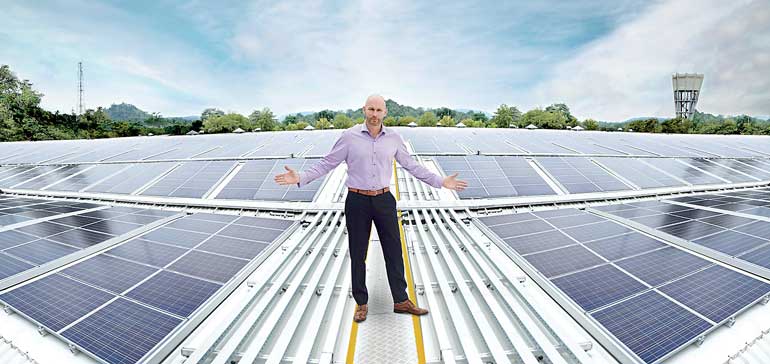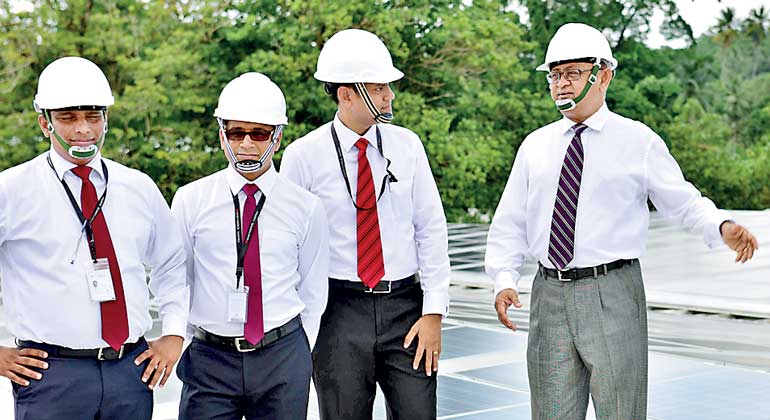Wednesday Feb 25, 2026
Wednesday Feb 25, 2026
Friday, 6 November 2015 00:00 - - {{hitsCtrl.values.hits}}


At the launch of its one-megawatt rooftop solar solution, apparel and fabrics giant MAS says the greatest, biggest or best isn’t good enough. The real switch to renewable solutions is sometimes a simple change of mind and how determined you are to look beyond cost.
The solar story is not a new one to MAS Holdings but the Group’s commitment to renewable energy went a notch higher this month with the unveiling of Sri Lanka’s largest rooftop solar plant at the MAS Fabrics Matrix plant inside its Fabric Park in Thulhiriya.
But that isn’t the real story. For Matrix whose rooftop now carries the weight of 3,900 solar PV panels, roughly the size of 1.3 football fields, the project began with a simple decision by its CEO Ivan Brown that solar power will somehow be part of its energy mix as an extension of their sustainability investments.
Matrix operates as a dedicated knitting facility for Nike Flyknit and Brown says the solar investment is a milestone that adds further value to a product which already has the environment in mind with the use of recycled polyester and closed loop initiatives.
MAS inherited a dilapidated building when it acquired the former textile mill in 2006. When Matrix joined the MAS family in 2012 it chose to restore and renovate 400,000 square feet instead of building a greenfield site to ensure its carbon footprint stays small.
“At MAS the Matrix solar solution is not just another solar project it’s the one which has harnessed all the good energy of the group and I am not talking simply of electricity,” says Brown, who spent a large part of 2014 changing minds about the need to switch on what he calls the “inner change”.
“Breaking that paradigm that it takes 20 years to get a return on clean energy is the toughest job. We revisited the concept of ‘cost’ and we did it after countless hours of rehashing the ‘standard’ ROI measurement and seeing the value beyond revenue growth,” he added.
The commitment to sustainability at MAS is a daily routine and isn’t limited to landmark projects.
“Business and industry think of sustainability projects from a revenue growth or cost perspective and that needs to change,” says Brown. “Why not adopt a simpler approach of change that comes from the inside change that happens simply for our own peace of mind? It may never make financial sense to some but it does, and it carries far more value and inspires more conversations than a one off project which takes the stage for a matter of time,” he added.
MAS Brands Managing Director Ajay Amalean says the group’s commitment to sustainability goes beyond unveiling marquee solutions.
He reveals: “41% of MAS runs on renewable energy and the culture of self-driven change and constant innovation is something we will carry into the future. Our journey to make a difference to the environment began in 2010. We wanted to set the benchmarks and raise our capabilities. This is just the beginning of a journey that will be continued by several generations of MAS.”
MAS says industry has a choice – to keep denying how energy trends are changing worldwide and seek only payback or take a moral stand on social and environmental grounds and adopt clean energy as a leap of faith.
The Central Sustainability Team spent many hours investigating the best solution for Matrix which involved choosing the correct type of solar installation to picking the right vendors, to reviewing the engineering challenges of mounting the giant solution on a single roof.
Director of Environmental Sustainability Sharika Senanayake says MAS believes innovation in clean energy is booming and it would only be a matter of time before renewable energy becomes a way of life. She says the hurdles are much higher and more complex for industry to adopt large-scale renewable options but this will and must soon change if we take our own history for example.
“Climate change presents us with a huge opportunity to redefine how we live in the world. We must not assume fossil fuels to be our only solution. We have to expect that people will continue to be resilient, creative and intelligent and just like the innovations of the past 150 years we will continue to push the boundaries of what we think is possible in clean energy production,” she added.